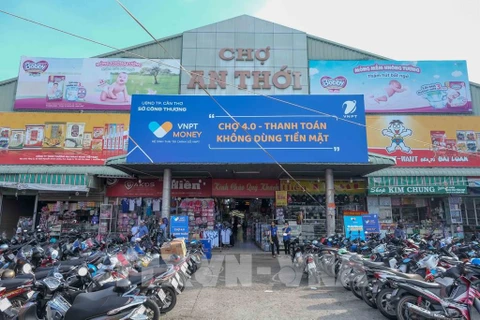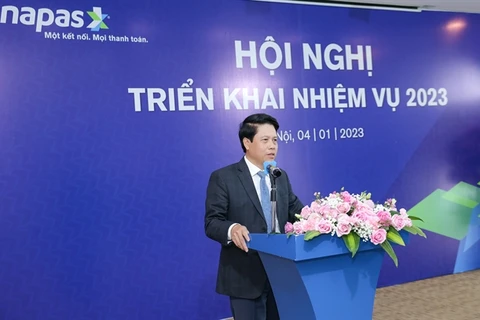Hanoi (VNS/VNA) - For Vietnam to fully tap into the digital future, experts say institutions and policies must be reformed to reflect Government commitments.
Phung Anh Tuan, executive vice chairman and secretary general at Vietnam Association of Financial Investors (VAFI), passed the remarks at the Fintech Revolution Summit in Hanoi on March 27.
The two-day summit is attended by BFSI experts, fintech leaders, ministry and central bank authorities, investors and corporates across Vietnam.
The Vietnamese Government is advocating the development of a digital economy and promoting industrial revolution 4.0, said Tuan.
Many directives have been on promoting non-cash and electronic payments, including Resolution 02, dated January 1, 2019, and Decision 1813, dated October 28, 2021.
The policy and law-making process should reflect the Government's commitments, noted Tuan.
The VAFI representative expects some fintech policy changes, including amendments to some articles and clauses related to payment in prevailing legal documents such as the Law on the State Bank of Vietnam, Law on Credit Institutions, Law on Prevention of Money Laundering and other relevant legal documents and decree replacing Decree No 101/2012/ND-CP on non-cash payments.
He also recommended developing mechanisms and policies on national digital currency; designing a pilot mechanism for peer-to-peer lending; developing a pilot project (sandbox) for fintech; and developing a pilot project for mobile money.
Market trends
Up to 55% of Vietnamese people purchased via online marketplaces, while 93% have at least one banking app installed, said Nagesh Jaladi, VP-Marketplace Solutions at Crayon Data, at the summit.
About 66% of first-time users shopped online through apps and websites, and 75% plan to splurge this year despite inflation negatively impacting categories except for groceries and fuel.
However, he added that banks continue to face multiple challenges in organising and consuming data.
About 71% of banks underperform at collecting and utilising customer data.
Nearly 30% of banks can integrate structured customer data to use in AI initiatives.
Only 8% of banks can apply predictive insights from their machine-learning models to inform campaign execution and decision-making.
For seamless customer experience, building blocks are needed, including data, algorithms, expertise and partnerships, said Jaladi.
Data and AI platforms aim to transform raw data into consumable outcomes. In addition, algorithms aim to deepen customer engagement and manage risk.
This will create a relevant, unified digital experience and scalable merchant ecosystem.
Vietnamese Government has a programme to get those without a bank to 20% from its current 50-65%.
Technology is coming in to help, said Peter Marini, VP – Of sales for the APAC region at Crayon Data, a Singapore-based company focusing on leveraging artificial intelligence, to Viet Nam News.
"The fact that also here in Vietnam, mobile penetration is very high, now it means being able to use mobile banking become much easier for those consumers to move from the unbanked to the banked," said Marini.
Once consumers were starting to get engaged in the banking world, Crayon Data could bring its technology to help the mobile banking banks build and extend those services, he added./.
Phung Anh Tuan, executive vice chairman and secretary general at Vietnam Association of Financial Investors (VAFI), passed the remarks at the Fintech Revolution Summit in Hanoi on March 27.
The two-day summit is attended by BFSI experts, fintech leaders, ministry and central bank authorities, investors and corporates across Vietnam.
The Vietnamese Government is advocating the development of a digital economy and promoting industrial revolution 4.0, said Tuan.
Many directives have been on promoting non-cash and electronic payments, including Resolution 02, dated January 1, 2019, and Decision 1813, dated October 28, 2021.
The policy and law-making process should reflect the Government's commitments, noted Tuan.
The VAFI representative expects some fintech policy changes, including amendments to some articles and clauses related to payment in prevailing legal documents such as the Law on the State Bank of Vietnam, Law on Credit Institutions, Law on Prevention of Money Laundering and other relevant legal documents and decree replacing Decree No 101/2012/ND-CP on non-cash payments.
He also recommended developing mechanisms and policies on national digital currency; designing a pilot mechanism for peer-to-peer lending; developing a pilot project (sandbox) for fintech; and developing a pilot project for mobile money.
Market trends
Up to 55% of Vietnamese people purchased via online marketplaces, while 93% have at least one banking app installed, said Nagesh Jaladi, VP-Marketplace Solutions at Crayon Data, at the summit.
About 66% of first-time users shopped online through apps and websites, and 75% plan to splurge this year despite inflation negatively impacting categories except for groceries and fuel.
However, he added that banks continue to face multiple challenges in organising and consuming data.
About 71% of banks underperform at collecting and utilising customer data.
Nearly 30% of banks can integrate structured customer data to use in AI initiatives.
Only 8% of banks can apply predictive insights from their machine-learning models to inform campaign execution and decision-making.
For seamless customer experience, building blocks are needed, including data, algorithms, expertise and partnerships, said Jaladi.
Data and AI platforms aim to transform raw data into consumable outcomes. In addition, algorithms aim to deepen customer engagement and manage risk.
This will create a relevant, unified digital experience and scalable merchant ecosystem.
Vietnamese Government has a programme to get those without a bank to 20% from its current 50-65%.
Technology is coming in to help, said Peter Marini, VP – Of sales for the APAC region at Crayon Data, a Singapore-based company focusing on leveraging artificial intelligence, to Viet Nam News.
"The fact that also here in Vietnam, mobile penetration is very high, now it means being able to use mobile banking become much easier for those consumers to move from the unbanked to the banked," said Marini.
Once consumers were starting to get engaged in the banking world, Crayon Data could bring its technology to help the mobile banking banks build and extend those services, he added./.
VNA

























